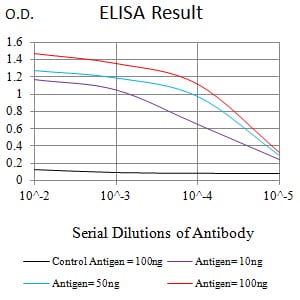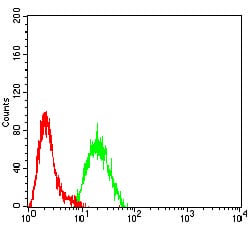

| WB | 咨询技术 | Human,Mouse,Rat |
| IF | 咨询技术 | Human,Mouse,Rat |
| IHC | 咨询技术 | Human,Mouse,Rat |
| ICC | 技术咨询 | Human,Mouse,Rat |
| FCM | 1/200 - 1/400 | Human,Mouse,Rat |
| Elisa | 1/10000 | Human,Mouse,Rat |
| Aliases | HALR; MLL3; KLEFS2 |
| Entrez GeneID | 58508 |
| clone | 7D5D7 |
| WB Predicted band size | 541.4kDa |
| Host/Isotype | Mouse IgG1 |
| Antibody Type | Primary antibody |
| Storage | Store at 4°C short term. Aliquot and store at -20°C long term. Avoid freeze/thaw cycles. |
| Species Reactivity | Human |
| Immunogen | Purified recombinant fragment of human KMT2C (AA: 1-205) expressed in E. Coli. |
| Formulation | Purified antibody in PBS with 0.05% sodium azide |
+ +
以下是关于KMT2C抗体的3篇参考文献,简要整理如下:
1. **文献名称**:*KMT2C deficiency promotes small cell lung cancer metastasis through transcriptional activation of EGFR*
**作者**:Chen, Y., et al.
**摘要**:研究通过Western blot和免疫组化(使用KMT2C抗体)发现,KMT2C缺失通过激活EGFR通路促进小细胞肺癌转移,提示其作为潜在治疗靶点。
2. **文献名称**:*Epigenetic regulation by the MLL3/MLL4 branches of the COMPASS family in development and disease*
**作者**:Shilatifard, A., et al.
**摘要**:综述MLL3/KMT2C和MLL4/KMT2D在表观遗传调控中的作用,提及利用特异性抗体研究其与发育疾病(如癌症)中组蛋白修饰的关联。
3. **文献名称**:*Recurrent mutations in chromatin regulators in HER2-positive breast cancer*
**作者**:Bose, R., et al.
**摘要**:通过免疫沉淀(KMT2C抗体)分析HER2阳性乳腺癌样本,发现KMT2C突变导致染色质重塑异常,影响肿瘤进展和耐药性。
如需具体文献来源或DOI,可进一步提供数据库检索关键词(如PubMed/Google Scholar)。
The KMT2C antibody is a research tool designed to detect KMT2C (lysine methyltransferase 2C), a protein encoded by the *KMT2C* gene in humans. Also known as MLL3. KMT2C belongs to the COMPASS family of histone methyltransferases, which catalyze the methylation of histone H3 at lysine 4 (H3K4), a modification associated with active gene transcription. KMT2C plays a critical role in regulating chromatin structure and gene expression, particularly in development, cellular differentiation, and tumor suppression.
Mutations or dysregulation of KMT2C are linked to cancers (e.g., breast, lung, bladder) and neurodevelopmental disorders. Researchers use KMT2C antibodies in techniques like Western blotting, immunohistochemistry, and ChIP-seq to study its expression, localization, and interaction with chromatin. These antibodies help investigate KMT2C’s role in epigenetic regulation, its involvement in disease mechanisms, and its potential as a therapeutic target.
Validation of KMT2C antibodies is crucial, as cross-reactivity with related family members (e.g., KMT2A/B/D) can occur. High-quality antibodies are often verified using knockout cell lines or siRNA knockdown to ensure specificity. Current studies focus on KMT2C’s partnership with tumor suppressors (e.g., p53) and its impact on enhancer regions, shedding light on its dual roles in maintaining genomic stability and modulating transcriptional programs.
×